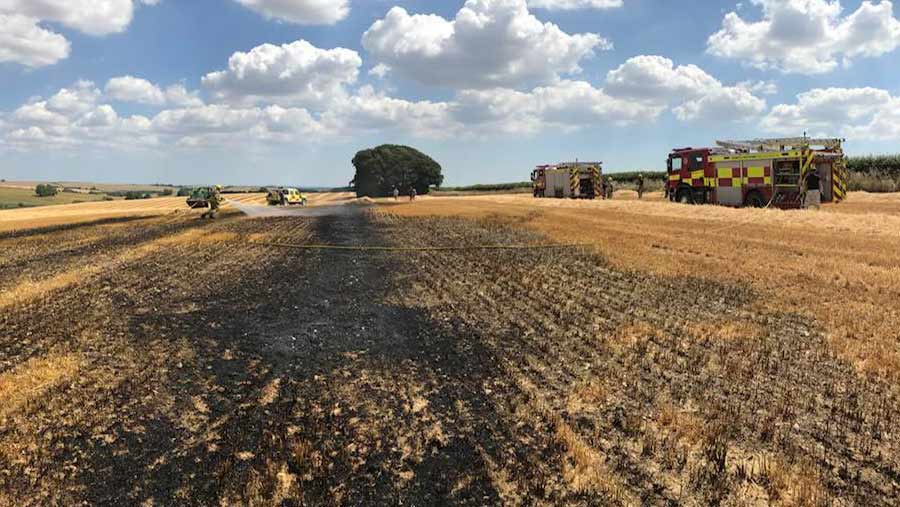Fire warning as harvest continues in tinder dry crops
 © FF D Foxwell/Dorset and Wiltshire Fire and Rescue Service
© FF D Foxwell/Dorset and Wiltshire Fire and Rescue Service Industry leaders have issued an urgent plea for farmers to take fire precautions as harvest gathers pace in tinder dry conditions.
The sustained dry weather shows no sign of abating and farm fires have been reported across the length and breadth of the UK.
See also: ‘Horrific’ field fire rips through standing crops
Combine and baler fires have been reported in the West Country, East Anglia and the south east of England.
Major blazes continue to burn on open heath and moorland, and concerns are growing the situation could become much worse as heavy machinery and equipment starts harvest work in parched crops.
Pushed to the limit
Rural insurer NFU Mutual warned there was always a risk of fire on farms but harvest made it greater as machinery which had been standing idle was suddenly pushed to its limits.
Rural affairs spokesman Tim Price said harvest 2018 conditions were “extreme and in some regions even drier than the fabled summer of 1976”.
“It means many people will not have experienced this before and won’t fully appreciate how dangerous the situation is.
“But the risk of sparking a fire that quickly spreads across large tracts of land is now at a critical level,” Mr Price said.
“Sparks, friction or the smallest naked flame from a single match could be all that it takes to start a devastating inferno.
“Even overheating in balers or combines should prompt an urgent and immediate shutdown,” he stressed.
Mr Price added the message must be made clear to all staff.
“Harvest time sees a lot of extra labour on farms, many from overseas who may have a language barrier.
“It is vital that the message to take extra care is pressed home and understood by everyone,” he said.
Reducing risks at harvest
The NFU has published advice on reducing the risk and information on what to do if fire breaks out.
Reducing risks
- Ensure machinery is chaff free, serviced and in good condition
- Have a tractor and associated equipment ready to cut a fire break if necessary
- Keep a full water bowser or tank nearby when harvesting
- Regularly check and maintain open water supplies for fire fighting
- Remind employees to be careful with cigarettes and matches while harvesting
- Test fire extinguishers and ensure workers know how they operate
- Remove hay and straw from fields as soon as possible after harvesting
- Store straw separately from other buildings in stacks away from roads and other thoroughfares
- Secure buildings and outhouses with alarms and CCTV if possible
What to do if a fire breaks out
- Get to a safe place – further away than you think necessary as fires can move quickly and in unpredictable ways
- Call the fire and rescue service without delay
- If possible, send someone to the farm entrance to direct the fire and rescue service
- Prepare to evacuate livestock should the fire spread
- Prepare to use farm machinery to assist the fire and rescue service.
Farm fires latest
Mapperton, Dorset
Eight fire crews tackled a large field fire at Mapperton Farm near Winterbourne Zelston on 8 July. Firefighters reported the blaze spread rapidly to cover an area of 500m by 500m which needed 10 hose reel jets, a mainline and beaters.
Stroud Farm, Berkshire
Firefighters tackled 60t of burning straw as fire swept across 6ha of stubble.
Four fire engines were sent to Stroud Farm near Maidenhead who tackled the blaze for more than 15 hours on 3 July.
Chiverton Farm, Devon
A 10ha field of standing barley caught light at Chiverton Farm near Kenton on 8 July. Devon and Somerset Fire and Rescue Service brought the blaze under control with four fire engines, a 4×4 vehicle and water tanker along with a bowser from a nearby farm.
Old Rectory Farm, West Midlands
A small herd of cows was evacuated at a country park farm as fire ripped through their housing on 8 July. West Midlands fire service used two fire engines and eight firefighters to battle the blaze.
Ben Bhraggie, near Golspie
A wildfire broke out across 20ha of farmed land near Golspie in Scotland on Saturday 7 July.
Firefighters tackled the flames throughout Sunday and nearby farms were warned to stay indoors as the ash and soot was blown by strong winds.
